#though i guess I do understand that it represents a specific thing in the narrative and it wouldnt make sense to have that much more of it
Explore tagged Tumblr posts
Photo
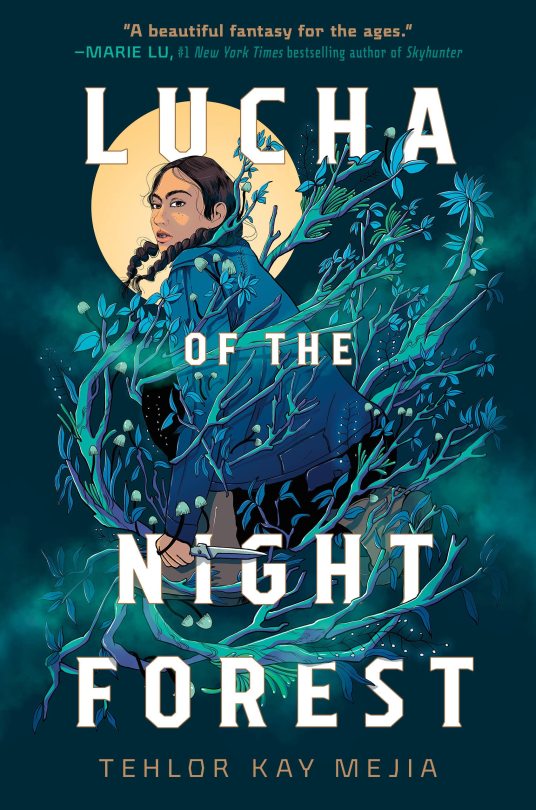
2023 reads // twitter thread
Lucha of the Night Forest
YA fantasy about a girl struggling to survive with her sister in a land overtaken by a forgetting drug, who makes a deal with a forest god to escape
spooky fungi magic, forest, sisters, lesbian MC
#Lucha of the Night Forest#aroaessidhe 2023 reads#ooouagh i like this a lot#def enjoyed the spooky fungi horror adjacent bits the most - which tbh is like 1/3 maybe 1/2#would love if it was spread more through the whole thing#though i guess I do understand that it represents a specific thing in the narrative and it wouldnt make sense to have that much more of it#I do think that the sort of…antagonist motivations and plot related to all that was a little simple#and I can imagine an alternate version that’s longer (series?) and much more complex which would be even better#which would result in her spending more time with the spooky fungi power stuff#but like also I guess there’s positives to a simpler standalone also. sometimes making something longer and more complex just makes it muddi#muddied and bad lol#she could have been a bit more evil is all im saying#i kinda wanted to know more about the wilder worldbuilding also -#tho understand that wtf would a poor girl who’s never left her town or the forest know about the wider world#the romance is a little instalovey i guess but also imo it’s only showing the beginning of a posisble relationship anyway?#anyway i gave this 5 stars. its my vibe. i wanna do fanart#yes girl kill him with mushrooms#sapphic books#lesbian books
28 notes
·
View notes
Text
Watched 9-1-1 for the first time (and caught up) Here are some unsolicited and unfiltered opinions about our fave gay firefighter show.
Bobby Nash: Must be protected at all costs. Traumatized dad doing his gosh darn best. So happy he is loved by the 118 and that he seems to be accepting that more now.
Athena Grant: There's a post out here somewhere about how people named after gods/goddess embody that deity. And Athena? Yeah she does exactly that. That woman deserves so much respect for the badass she is.
Howie "Chimney" Han: Silly goofy man who needs a hug and appreciation. His storyline with Kevin and every parallel to Albert made my heart hurt.
Evan "Buck" Buckley: Sweet baby boy, the firefighter Dean Winchester of another universe. I LOVE THIS MAN. Seeing him smile on screen is so infectiously amazing and I want to send a strongly worded letter to all the writers who are clearly trying to make sure I stay in the "fix-it" tag of Ao3. He is by far my comfort character in the show and someone needs to tell that man that he is loved.
Eddie Diaz: If I had to describe my type in two words it would be "Eddie Diaz." Holy fucking shit. (<- written by Buck.) But seriously, I've seen some stuff about how he's not the "best" latino representation because he does not have any specific cultural storylines ( I would love to see celebrations or other cultural things too, maybe for 8B and onward) but I for one feel represented plenty by his complicated relationship with expectations coming from his parents, partners (former or otherwise,) and himself.
Hen Wilson: GIVE THIS WOMAN A BREAK. I love her and it seems like she is always hurting when it comes to her family. Please give my queen a goddamn break. Some domestic bliss would do her kindly.
Maddie Buckley Han: When I say that I would die for her to be safe and happy, I mean it. The Buckley siblings have dealt with so much but Maddie, her storylines not only hit something compelling and dramatic but they are also too fucking real.
Christopher Diaz: I love him. Amazing. A fucking king. No Notes. Please come back to your dad(s).
Carla Price: LOVE THIS LOVELY HUMAN.
The Grant-Nash Fam: Harry and May are interesting characters and I really do love seeing them on screen, I understand why we see less of them though. Michael and David were lovely as well.
The Wilsons: Imma repeat what I said earlier, give them an episode where the biggest thing to happen is juice boxes getting left behind. They need a break. And give Karen more damn screen time that isn't just crying and fighting with Hen.
Josh Russo: the pre-Glee/ post Glee explanation was gold.
Captain Vincent Gerrard: Grumpy old man that needed a cozy job. Loved his "taking you under my wing" moment with Buck.
The Bigger Love Interests (Eddie):
Ana: I really liked her character, but saw how much anxiety was embedded into that relationship. She was never sure of her place and he was never sure he was ready.
Marisol: This felt weirdly rushed and like it happened mostly off screen. The nun thing was... catholic guilt intro I guess??
Shannon: Oof. The drama, the need for closure. I enjoyed having her on screen and I cried when she passed.
The Bigger Love Interests (Buck):
Abby: He was much more invested in the relationship and I think part of it was the circumstances but the way she left him was so damaging to his psyche. Not a fan.
Ali and Natalia: They did not leave a lasting impression on me. Though Natalia being interested in Buck because he died did raise some red flags.
Taylor: Listen... I love her fierce independence so much. But she did Buck so dirty. Trust issues and abandonment issues for Buck coming right back up.
Tommy: Narratively speaking, I tried to understand why he happened but I don't. His confusion at the beginning of the relationship just made me think that he just went along with what Buck thought he wanted. As a character, that man felt a bit one dimensional, and when he showed an ounce of personality it was always an interaction with Buck that made him feel lesser than. I feel blessed that man is off my screen.
The Writing/ The Plot:
At this point I am watching for the two idiots sharing a brain cell. But.. the disasters and plots are out of left field and really interesting. It takes a lot for a procedural type show to not fall into formulaic/ average 911 calls and I feel like at least one writer has a subreddit or something pinned to get ideas. I am far too invested in the 118 to leave now.
What do I ship at this point?
Buck and Eddie.
Athena and Bobby.
Maddie and Chim.
Hen and Karen.
Would I recommend this show?
Abso-fucking-lutely... if you enjoy some pain, I swear all these characters go through so much and the tissue boxes are not enough.

Thanks 9-1-1 for bringing me back to Tumblr.
And if anyone has headcanons, I would love to hear them!
#9 1 1 on abc#911 show#firehouse 118#911 spoilers#not spn#buddie#eddie diaz#evan buck buckley#maddie and chim#the wilsons#grant nash family#buckley diaz family#911 abc
45 notes
·
View notes
Note
Ngl, I think Chloe was done dirty in the show
She should've had her own fairy godparent then share with Timmy. Plus she was introduced when the show was dying and was used as an attempt to revive it.
I want a Chloe redemption, give her what she deserves.
agree! like, her introduction was awful and actually truly failed to introduce her character sincerely or accurately it was so baffling. i watched season 10 twice, first in reverse order then in proper order and it was actually absolutely wild how absolutely nothing in her introduction episode was really that indicative of her character??? it doesn't truly capture any of chloe's quirks and complexities, or even really why she would need godparents, and barely anything in the episode actually carries into any episode beyond that besides, like, the turners being rich for the rest of the season? which is not a decision i liked, and it really only served as a half-hearted reason for the carmichaels to hate the turners inexplicably, but they really didn't need to be rich for that. the turners being rich could have been interesting if they actually brought back remy, though, since the turners literally bought the country club that remy's parents owned. whatever.
i mean, i think i understand what they were trying to do - setting timmy up as being jealous and frustrated with her and then forcing him to have to try being cordial, to force them to have to work in tandem, makes sense as a narrative and stakes. and revealing that she isn't actually as perfect as he initially believes her to be also narratively makes sense! but sadly the execution of these ideas is very disjointed and shallow. not to mention the way they tried to explicitly spell out its themes was extremely forced. it's kind of a retread of both imaginary gary (the episode) and the boy who would be queen in those aspects, but lacking cohesion. it feels like maybe a first draft that wasn't revised nearly enough, or something. maybe it was! maybe they hadn't truly figured out what they really wanted to do and by the time they did it was too late. i dunno, but whatever it was, the end result is the same: a lot of people barely make an effort to understand chloe as a character and instead parrot whatever reviewers said about her intro a decade ago. and i get it, i'm not innocent of that either, i did the same thing years ago. but then i decided i wanted to come to my own conclusions. and i ended up loving chloe's character, she would have been a great addition to the series if she just came in at a better time. she was a great foil for timmy! and their chemistry as friends was actually great!
and... to that second point... i guess i think you're objectively right, a lot of viewers would likely have an easier time accepting chloe if she had been introduced with her OWN fairies, separate from cosmo and wanda, while just coincidentally becoming friends with timmy... or even being the protagonist of a sequel would have been less controversial... but i also kind of disagree. the fact they were forced to share cosmo and wanda was actually one of the more interesting aspects of the season to me, even if the actual reasoning behind it was dog water. but i really liked the dynamic that formed as a result. this sort of allegorical stepsibling, blended family dynamic. i like the way that cosmo and wanda specifically both represented different attributes and values they needed in their lives! i like what this specific set-up added, even if i find the execution of most of its episode ideas to be um. well. season 10. i honestly think a better way to introduce chloe and incorporate these dynamics i found so interesting would have probably been to make them actual, literal stepsiblings and not just allegorical fairy god-stepsiblings. not sure who would have been into that besides me, though.
sighs loudly. maybe someday ill rewrite season 10 or something. i have a lot of story ideas for chloe.
27 notes
·
View notes
Note
bunny! love you and thanks for your work and talent ;)
could you please clarify for me why Drive to Survive is unreliable thing about F1? i get that it's speculated a lot but still want to understand more, thank you
<3
Hi, thank you <3
Writing this on my phone so please excuse any mistakes!
The unreliability of documentary as a media form is inherent, because in order to produce documentary, the director must construct a narrative. This narrative is taken from reality, but it is also inherently biased to what the director sees, what editors see, etc. Even if I was a fan of DtS, I would have this criticism of it. Documentary CANNOT BE RELIABLE. It’s in the nature of the format.
But specifically for Drive To Survive:
The most glaring issue with this series is that it is commissioned by Liberty Media, who are responsible for the sport’s promotion. It was taken to Netflix in 2017 and has continued since. This means that they can’t really show anything unsavoury, or things that might disillusion people from watching the sport. That’s an extra level of bias.
Additionally:
In the first season, the producers had VERY limited access to the top teams. Both Mercedes and Ferrari wanted nothing to do with the camera crews, given they had a lot more to lose. RBR was the only top team willing to be in the show, and at the time they were kind of averaging third-fastest over the course of a season. The lack of insight into the top teams’ mechanics is frustrating to me in those episodes.
It also requires some sort of foresight, which is impossible. The way DtS is produced means that they have to guess who will have a Big Weekend, since they are embedded into teams from Wednesday to Sunday. And some race weeks, they aren’t there at all. If they have no footage of something, they can’t weave it into the narrative they’re constructing, so it gets left out. In the 2023 season, towards the back-end, one of the biggest narratives amongst fans was the emerging rivalry between Norris and Piastri, phenom rookie, who won a race before him in Qatar, and the emergence, too, of a very fast McLaren in the back end of the season. These were almost entirely left out of DtS because Netflix was not at Qatar.
Qatar was a big weekend for Mercedes too, because Russell and Hamilton crashed into each other, and there was a lot of noise over the public apology Hamilton gave etc. It got left out, though.
The main issue that the drivers and teams have is that its largely sensationalised and designed to create tension that simply isn’t there during the season. Verstappen was particularly vocal about this, and he suffers a fair bit: he was villainised in 2018 vs. Ricciardo, and then again in 2021 vs. Hamilton.
DtS also has its “main characters” in Ricciardo, Sainz, Alpine, and Haas (Geunter Steiner) etc, who let the DtS crews have more access than the average driver, like perhaps Verstappen or Leclerc (and Ferrari). Relying on personal footage means that DtS picks its main characters before we know who the main characters of the Actual Season are, which limits their ability to roll with the punches and represent the sport accurately.
It tips the balance of footage towards personal lives, with a lot of footage being taken from off the track / outside race weekends, which I personally don’t think is necessary, and also opens up drivers to parasocial relationships from fans (some drivers suffer a lot more than others, i.e. Norris, Leclerc, Sainz).
I think my main criticisms of DtS come from a) the format (its completely non-chronological, and hops from team to team which means that inter-team conflicts are minimised in favour for intra-team ones) and b) it is a behind-the-scenes of the drivers, not the sport. I’d prefer to see most of, if not all of, the footage taken from race weekends, and for the series to be a peek behind the curtain at the sport itself, but Netflix is (or was, at the time) not allowed access because there is A LOT that these teams want to keep secret from camera crews, and this doesn’t just go for DtS: it also goes for the actual media present in the day-to-day of the sport.
A lot of this is My Opinion, but I share a lot of these sentiments with F1 fans. I watch DtS as a fun little bingo thing at the end of the year, rather than a replacement for the season.
That being said, the positive about DtS is that it gives an overview from 2018 onwards and allows new fans to learn enough quite quickly to interact with other fans, who have their own takes and thoughts and can even out the bias DtS presents us with. It gives a decent baseline understanding of the sport, even if Will Buxton has become somewhat of a meme because of it.
Hope that helps:) DtS is also NOT the only docuseries on f1 - theres the Brawn GP doc (v good) and Leclerc and Verstappen each have stuff produced about them by Canal+ and Viaplay respectively.
13 notes
·
View notes
Text
This song is so angsty and satosugu coded to me. I mean hear me out on these verses.
Suguru POV:
“I went out last week, trying to get on my feet, and I can’t do anything, I just sleep and won’t eat. This is a crisis, I know I can’t hide it. You see it in my eyes, although I try to fight it.”

“I think I see you too, all the things you went through.”

“I try to blame it on me, you try to blame it on you”

“Always say it’s okay, but then I see how you move, push yourself away, you’ve got nothing to prove.”

“And I always thought life would bring me back to you”

“Second guessing what we went through, I don’t want to face the truth.”

Then, perhaps both, but leaning more Satoru POV:
“Fuck with you. It’s complicated, I’m still in love with you,”

“And I would never say it to your face, yeah, I know you’re doing great, but I think I about you daily, I’ve been going crazy.”

“I gave you my heart, though I knew it was reckless. When I was around you wore it like a necklace. As soon as you’d leave, you put it back in your desk, my friends they all warn me but I hope for the best.”

But undeniably Satoru POV:
“I’m still hanging where you left me, on the corner of the stairs feeling empty. Pick me up when you get bored, yeah, then put be down.”

And then if we consider the chorus:
“Tell me what I want to hear”
Tell me you’re sorry, tell me you want to come back, tell me you want to start over with me.
vs.
Tell me you don’t hate me, tell me you understand why, tell me you forgive me in spite of what I’ve done.
“You’re like a diamond chandelier.”
You’re valuable, and beautiful, and strong, and sparkling, and you light up every room you’re in.
vs.
As beautiful as you are, you’re also more fragile than you look underneath all those sparkles.
“It’s like staring down the barrel of a gun.”
We’re doomed by the narrative.
Anyways, this has been my first contribution to this fandom. Hope you enjoyed my rambling and finding traces of them in obscure music. They really do live in my head rent free. It makes me wish I had the knowledge, talent, and patience to make an edit of clips of them with this song. You can see my vision in the photos I chose to represent specific lines, but I digress.
#Spotify#satosugu#stsg#lyric analysis#jjk satosugu#I’m so sick for them#jjk ship#sashisu#sgst#sugusato#gego#goge
14 notes
·
View notes
Note
I think what i like about Toko is the way the too off them play off each other. Both are stubborn, blunt, loud and insensitive to others. Both came from a posh upbringing. Among other things it leaves them both a bit self-centred, which they both struggle with. Toph wants nothing but move away from home, while Zuko does everything to return to it. Toph hates rules, while Zuko is a stickler for honor (unless the ends justify the means, which usually benefits himself). Zuko is a terrible liar while Toph can turn into a doll on a dime while also being a human lie detector. They have one good eye between the two of them. They both have so much room to grow as people. There's billion things more like that really.
I can't tell you what specifically made me interested in romance between them. I think i just already read a few fics about them being friends it made curious how those dynamic would play out in a romance.
It's funny to see you liken Kataang to Toko. Since despite it's ubiquity if never really felt one way or the other for the former, nor do i think much about it. My guess the appeal of the ship would be what those too represent to each other, which would be quite different from the more interpersonal dynamic appeal of toko. But you point i out there some interesting parallels there.
I don't really hate season 3 myself, though i'd call it probably the weakest of all the seasons. Funnily enough the Zuko gaang interactions are something i'm mostly fine with. I mostly just find the way they team up a little clunky, as well as Zuko being unable to imagine why Katara would still be mad at him and the general asspullery of the finale. So i'm curious what you think about that.
Hello! Happy Holidays and thank you for our question! And sorry for a very late answer, I really want to start answering on time next year! You showed me at the the very interesting parallels between Toph and Zuko, and I’m entirely agree with you. I’m gonna repeat what I was saying in my last answer to you. I think that the reason of why Toko is not so popular is that fandom doesn't see them right. Fandom always tries to see Zuko as super restrained, manly and steady grown up guy loaded with mature decisions and endless amount of altruism. Meanwhile Zuko is just traumatised kid, and his trauma is what dictates a lot of his character traits that fandom refuses to see. His impetuosity, impulsiveness, anger, egoism, and tunnel vision. And his sometimes happening disregard of other people. And all this melts unites with his kind heart and moral compass. And all that mess is what making him so interesting and appealing character. But unfortunately all these traits are seen as “problematic” and even ugly, and fanom just tries to ignore all of this. As a result the real and complex Zuko's character always is out of any discussion.
Toph is, usually, completely disregarded and ignored by fandom at all.She is being seen as a “gremlin” or “little bratty sister”, and people refuse to see that she is one of the most complex and well-written member of gaang. She has lots of conflicts and difficulties. (I’m telling about all this very mess, hope I’ll have enough time one day to develop this idea better)
She and Zuko are very close in the very same traits that fandom tends to deny in Zuko. Egoism, stealthiness, disability to trust, stubbornness and arrogance. They would be a great pair because their basic character traits are so similar and it would be easier for them to understand each other.
I also always loves how atla narrative connects Toph and Zuko with Aang. Aang sees Toph in the vision, so their meeting was predisposed, and Aang and Zuko’s arcs similarity is basically the heart of the show.

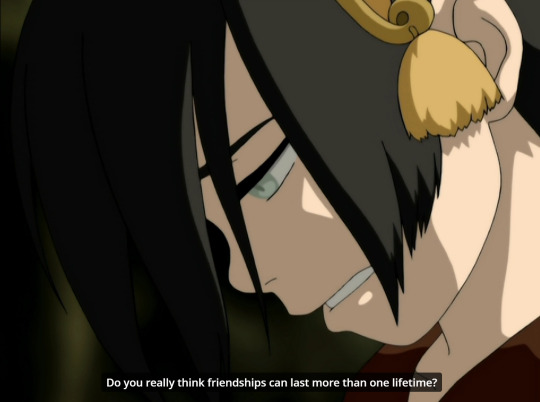
As you noticed, Toph leaves her home for Aang, for Zuko Aang is a way home. And later Toph and Zuko’s stories mirror each other, because, like Toph did, Zuko leaves his cruel family to join the gaang as an avatar teacher.
I really like how toko is similar to canon ship that plays the key role in the whole storytelling, Kataang. As well as Kataang, Toko grows from support and friendship, develops for a long time. It’s 100% “friends to lovers” trope. As well as in Kataang, one of the pairing starts feeling some romantic feelings from the very beginning (It’s canon that Toph feels romantically about Zuko, it’s clear in many scenes, “That’s how I show affection” is one of the most prominent) while another partner have only friendly-platonic feelings. And also Toph was the first from the whole gaang who trusted Zuko and even almost argued with others standing out for him. This is very clear similarity to Katara who always eagerly protects Aang, attacking anyone who can harm him.
Another moment that will never stop to amaze me in relation between Kataang and toko is their colour schemes that are built on complementary colours.

Complementary colours are the ones that placed opposite one another on the colour wheel. They empower and supplement each other. In visual arts, and especially in animation and character design colour schemes are one of the essential tools of the storytelling. Complementary colours are emotionally appealing, they show to the viewer connection and harmony between characters. Orange and blue - colours of Aang and Katara are complementary to one another as well as red and green - colours of Zuko and Toph.
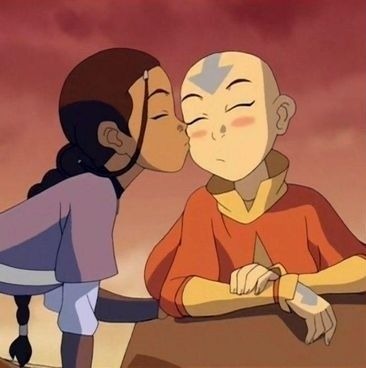
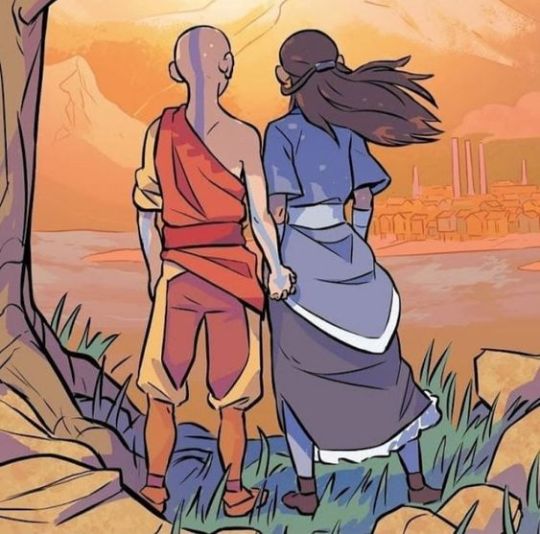
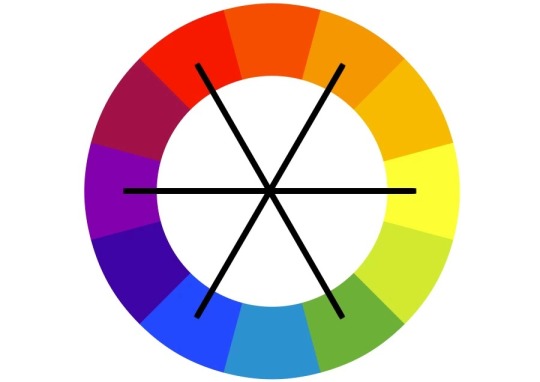


As for Third season I think that it was the weakest and terrible. It almost ruined characters of Aang, Katara, and, especially, Zuko and Iroh, transformed their complex and dynamic personality into two dimensional cliches. Lots of people complaining about comics for ruining characters, but actually it all originates in how third season destroyed lots of things. So called Zuko's redemption arc was lazily written, he was descended from the most complex and interesting character into the rather boring banality. Honestly after that "redemption" Zuko became much worse person them he had been before it. Again very composite and ambiguous Iroh was transformed into some mix of Dumbledore, Gandalf and stereotypical and racist type of "asian wiseman". he was stripped of anything that was making him interesting and unique. And that terrible westernised redesign of Katara and Zuko, complete rethinking of clothes and armor of fire nation warriors that was obviously stolen from some RPG?
I can discuss why 3rd season is terrible for long time. that my super unpopular opinion
Thank you once again for sharing your thought about toko! I always happy to discuss these wonderful characters with you🖤
#zuko#toph#avatar the last airbender#zutoph#kataang#toko#ask#long post#thank you!#otp#otp ship#lets talk#we need to talk about toko
31 notes
·
View notes
Note
just reading through the comments on that new byler evidence video by a laywer. (well not new evidence, but new video). someone said:
Though i am straight person i don't understand why i find Will and Mike's love story so incredibly beautiful and melancholic. After this video i am captivated and smitten by it all the more.
And i thought hey thats me too! Of course its partially because will and mike are relatable no matter their sexuality, but i do find their sexuality storyline very very moving, perhaps more than i ever expected to.
i mean, yes, I do get very emotional that there may be 'elder gays' (lol) especially who see the show and find peace or joy in it. there's something very moving about nostalgic representation... like a displaced sense of something, it will never quite be fixed but there's a fictional do-over somehow. adjacent, 'in some universe somewhere i might have had that young love too' etc. I think that's important, as much as modern rep for current queer youths. Especially because queer youth have power of youth i guess. there's the future, but people who have had their youth already, there's less time to witness change or fix things, so there's a deeper pain of regret as well. i think we can all relate to regret, queer or not.
and specifically THESE characters and the entire way it's been set up. it really is melancholy. even if they get their happiest ending, there will be a sense of melancholy that always pervades their story. i think byler is as much thematic of regret as it is of sexuality and awakening. perhaps this is where the notion of stopping time, turning back time, etc, comes into things. time is part of the show, and now has been revealed to be part of will's story with the frozen UD, but it's been mike's too, what with him being late in every ep1. metaphorically or literally, i can't wait to see them play with themes of time and regret next season.
Going through older messages, and this is very well said! Lovely words and sentiments.
I think that's what's so special about Stranger Things and about Byler in particular. It's not just some run of the mill cute ship a niche part of fandom for a show - it's a meaningful storyline all in itself. It's a part of a greater narrative. It represents something. There are really cool, interesting story themes that surround them. It's a deep arc, not surface level, not common. This is a very unique love story.
So excited to watch it actually happen.
6 notes
·
View notes
Note
Regarding the horror movies that are just about racism: I'm very passionate about the horror genre and it has been my biggest gripe with Jordan Peele. Most of his movies are literally just that. "White people bad, black people good" and tbh it represents 2 problems: 1) only a certain group of people can relate to the horror aspect of your movie since it's VERY INCREDIBLY SPECIFIC, so it brings into question if it's even really a HORROR movie or just a socially critical movie (I am Mexican, and I understand racism can be horrible, but I just think he handles it badly and is VERY targeted to black audiences only), and 2) if the narrative of the movie weren't just racism, and Jordan Peele wasn't black himself, would the movie still be good horror? When you take that out of the equation, that leaves him, in my opinion, as a very mediocre director, because he's brought nothing new to the table. Yet if you criticize his movies people immediately either call you racist or claim you don't get it because you have white privilege. I don't have to be a while blond woman to relate to how terrifying it would be to have a random dude in a mask follow me whilst killing everyone I love in the process. I don't have to be a lil kid living in a suburban neighborhood to understand how traumatizing it would be to be harassed by a random alien entity that disguised itself as a clown. If the only way for you to find a HORROR movie to be scary is ONLY if you check certain boxes of its narrative then it's NOT a good horror movie. (Sorry for the bible). In conclusion, that scene of the white chick separating the froot loops from the (white) milk in Get Out was incredibly fucking goofy and not subtle good writing at all. (Also, Chucky has been kicked or thrown in many movies and it has actually bought the protagonist time so I guess they don't do it more often because it's genuinely effective and it would eventually become boring lmao)
Fair assessment.
As a horror fan myself, I’m not even gonna necessarily argue that all horror needs to be universal, but it’s definitely worth pointing out that the best classic horror and horror with longevity is works within the genre with universalized themes.
Personally I love Rosemary’s Baby. I have never been pregnant and I have never been taken advantage of by a satanic cult. But there is something about the themes of vulnerability, manipulation, and gaslighting victims, I think we can all sympathize with parts of it, and we can understand why Rosemary wouldn’t or couldn’t just leave until it was too late. And even if you can’t relate, the framing and misdirection go a long way to get under the audiences skin.
I find it interesting to compare to a film like Get Out, which had some interesting concepts but kind of fell on its face. I love horror that deals with psychological manipulation and cults or cult like groups. But I think that no horror (or any film or story for that matter) should leave you asking “that’s it?” after it’s big reveal.
Funnily enough the film that actually sparked my post was a movie called In The Front Room, which started out very strongly, and I thought it was going to be more like Candyman (in the sense that it was a movie that dealt with how the myths we create around people is what gives them power, with the added layer of understanding about socioeconomic issues and racial dynamics, but not in a way that preaches at you, but just asks you to think about them in this context), unfortunately it was more like Get Out. Which sucks because these actors were really giving their all and the idea it began with with this family drama with sinister undertones and questions about faith and grief were very strong. The two female leads stole the show, but the racial politics woven into it were unsubtle enough that even though you rightfully hate the mother-in-law, the wife comes off as lacking accountability for her own role in her family’s circumstances.
Which to be clear, there were things I liked about Get Out and In The Front Room, but there was enough of what felt like the filmmakers jerking themselves off about their oh-so-clever social commentary that I ended up just rolling my eyes and not really desiring to watch Us or Nope or any other movies in this “racial commentary horror” genre.
4 notes
·
View notes
Text
Director's commentary about the Fake Woodcut Project
I guess it's pretty self-indulgent to write commentary on my own drawing because like, nobody asked? And who do I think I am, Moebius? And artists don't write commentary anyway. But I want to write down some things regardless.
There were specific sources of inspiration for it: really awesome map of Westeros by other-in-law (this is fanart), "Strange Religion" piece by The-Mirrorball-Man (not a fanart of anything specific, sort of a parody of religious imagery in general) and this whatever it is, from Midsommar.
What they have in common: all done in a primitive style, all very detailed and they tell a kind of story visually. I really liked all these pieces for a long time and wanted to do something in the same spirit. And another source of inspiration was that part from the Book of the New Sun, where characters in the unimaginably distant future retell the story of Theseus, only it becomes twisted and garbled with misunderstandings and confusion (Theseus is also a thesis another character creates, Minotaur is replaces by Monitor, the confederate submarine and so on. It makes more sense in the story). I hate Gene Wolfe, terrible author only ever read by pompous assholes, but that bit was really good. I recall it even now in its entirely thanks to my flawless photographic memory, btw.
So I wanted to take the Intercalate narrative, imagine how it would be re-told by some poor Latvian peasants in 18th century and create a kind of fake-folk-art piece they would have made, maybe. I came up with it as I was walking through an old cemetery. It was a very cold and windy morning and I wanted to snap some photos, but it was just too unbearably cold, and I was freezing. And as I was walking and photographing I kept coming up with ideas stupid ideas for this project and all the stupid jokes I'd put into this, giggling to myself all the while like a normal person.
And I also wanted to use ye olde derangede fpelling. What's that? Well, you know ye olde Englishe fpelling? Latvian also used to be goofy like that in its own way, there were no familiar modern diacritic marks and the spelling was very German-inspired. This, of course, would make it extra difficult for anybody to actually translate the damned thing, but I made sure that GPT4 can sort of do it. Our AI overlords are very smart, but not yet quite able to understand ye olde derangede Latvian with 100% success. Fun fact: I myself never knew about old Latvia orthography and only learned about it while walking though another old cemetery (not the one where I came up with the picture). The inscriptions on the gravestones were odd and it took me some time to even realize it was Latvian. So, I felt I had to do something with it.
One question I struggled with a little bit was: "do I want to put a bunch of swastikas in there?" I had decided that I'd put traditional Latvian symbols of various deities in the drawing and what not. Well, swastika is one of the more common such symbols that can possibly represent fire, or perhaps the sun, pretty fitting for the Intercalate. But I also thought: "if I put swastikas in there, this will be the only thing anyone wants to talk about. the conversation will be entirely about swastikas and nothing else. do I really want to do that to myself?" I went for half measures: one authentic, but not very noticeable swastika with fancy decorations, and that's it. This seems to have worked: it satisfied my craving for verisimilitude and I only got one question about it.
I thought my idea to give Sun-in-Rags an executioner's sword was very clever. You would think swords are edge-aligned, and you would be right, generally. But there is a type of sword not meant for a fair and glorious battle against an evenly matched opponent. Too heavy and unwieldy to do fancy fighting moves, too short for fighting, lacking the sharp point, designed for one purpose alone: to quickly, mercifully and beautifully end the life of someone already defeated and helpless. Such sword has no edge-element. Such sword is winter-aligned, and if Sun-in-Rags uses any weapon, this will be it. Also cool: one executioner's sword I found even has 3 holes on the tip, making a Winter sign. How neat is that?
There's a bunch of jokes in there nobody seemed to have got, but that's the running theme with all the stuff I draw.
3 notes
·
View notes
Note
Must know your Furina thoughts cause I’m forever a Furina defender. I see her as different from Focalor and like… I get why Focalor did what she did but god I’m so… I don’t like her
I have more thoughts but I’d like to know yours and then I’ll explode
Heyy hiya hi hey! Sorry for getting back to this a bit late, I have been in a hole. You know how shrimps are
But the short answer is, regretfully, MHY's writing made me really viscerally dislike her, at first. There was definitely resistance in my heart and that was frustrating in itself, because I do not hate Her exactly and I see why a lot of people liked her a lot (my friends liked her too. I was pretty solitary in my extreme disdain of her). I just hated the story that MHY is trying to tell with her, I hated what she represents (to me, at least), and I hate that I'm seeing people being a lot more forgiving with her (compared to Ei) because she's shown to be more emotionally vulnerable, which makes her more relatable (this isn't so much as like, a 'her fans are bad!' take from me, just to clarify. More so, it is an observation about how MHY is able to very easily use their storytelling to sway the audience and keep their attention on certain narratives, and I don't like the effect of their writing decisions).
Disclaimer, though, I hate, hate Marie Antoinette and that "sad, helpless, rich (white) woman" archetype, so when Furina/Focalors clearly has some inspiration (and when I see the audience immediately make some of that connection), it was immediately rigged against her in my head, lol. She had no chance.
In retrospect, though, the Marie Antoinette reference isn't that strong, but I don't know if that's because MHY really chickened out of the French Revolution inspiration, or because they just vaguely wanted the vibes of it without ever intending on committing to it, and I end up looking silly because I'm making connections where there are none. MHY writing is notorious for making people do that because it expects you to extrapolate from minimal and vague writing at times.
Anyway, then I started writing her. I wrote her into the family dynamic of the WRLT family, streamer modern/future AU thing I've got going on, and even for my canon rewrite/reinterpretation/filled-in-the-shit-I-didn't-like-and-made-it-work-for-me fic where she shows up very briefly at times, I couldn't exactly make her completely villainous either. That role I reserve solely for Focalors (who, arguably, isn't portrayed as a villain in canon, either. I just hated her more, and she's specifically written as a scapegoat for Furina Criticisms by MHY, anyway, so she's literally used, narratively, as an excuse for Furina's action as the ruler of Fontaine, so. It's functionally the same shit as Ei being like "erm that was the robot, not me..." just much, much better executed).
And she's really grown on me! Like, if I'm not so hung up on her whole "I may be the ruler of a police state, but I have feelings, too" thing, I think her personal story of having to perform a role, and having to meet an expectation that just gets further and further out of reach, and how she was shown to quite literally fall apart under that pressure was (through gritted teeth) well done. I Guess. I liked the way they unravelled her on a literal stage at the end of the MSQ. If anything, I will give it to MHY for their understanding of effective visual storytelling.
In her defence, Neuvillette also had the whole "I may be the ruler of a police state, but I have feelings, too" thing going for him. In many ways, you can argue that he's Worse because he's the actual, functional facet of Fontaine's Justice System, while she was treated more as the theatrical side. But, I will Say, MHY tried to sneak it in there that she also does work behind the scenes to help vulnerable people, and they also tried to say that she takes her job very seriously behind the scenes as well. She just acts like she's all fun. But, once again, because of their writing, I think it's horribly executed. Because aside from those Few Specific Moments where they showed her doing these things, no actual impact of her leadership was ever shown within Fontaine aside from the way she represents the Theatre-Court thing, BUT EVEN THAT MEANS NOTHING ANYWAY.
(So once again, in the same way as my Neuvillette ramble, you have MHY being like "is she actually helpless? Is she not? Can she actually make changes, can she not???" and they end up playing Accountability Hot Potato between her and Neuvillette where they're like, No, Actually. You're the one In Power! No You! No You! I'm a clueless Sovereign, I don't know humans, you're the Archon! But you are the one people actually take seriously as the Iudex, you're the one with actual political influence, and I'm not the real Archon anyway! Then Focalors is like, Wah, Celestia! That's the actual party you should blame! I'm actually the martyr here! Feel bad for me! And if Celestia pops up with playable characters you know they're gonna be like erm, actually, we also have clones who's been acting as us who's the actual evil ones, but it's not us I prommie.)
Like how the fuck have they not figured out about the Primordial Waters shit, like, a hundred years ago. You're telling me they are so damn good at their jobs, but it took them this long? To realise??? The Primordial Waters can be a big ass problem in the future that they should have prepared for in the past? It's almost like a nod to how IRL governments will ignore global warming and line their pockets allowing big corpo to continue wrecking the environment at the cost of the common people— oh wait, MHY vaguely suggested that too in the world lore about pollution caused by Fontaine's rapidly growing technological landscape, but they didn't do anything with it, because the Government that would get narratively criticised in Fontaine is Entirely Made Up of the Two Characters Products they're trying to Sell?
Oh, you're telling me the way Oratrice Mechanique D'Analyse is feeding off the people's belief in Justice while it literally hoards all the energy of the nation in order to fulfil Focalor's plan can almost be seen as commentary on how Media like True Crime commodifies Justice while platforms like TikTok literally profit off your engagement— oh wait it falls apart the moment you try to say that Focalors did this out of necessity in order to give Neuvillette back his sovereignty because those vaguely evil, undefined Ceslestia people?
And I'm sure someone could pop up and say like That's The Point! They're trying to show that someone is always above someone else, pulling the strings, and that Everyone has to do a little evil sometimes! As if that's not the easiest excuse for MHY to wave off writing accountability into their character stories.
But you know what poisons all of their writing to me? Knowing that they make products first, stories after. Every writing decisions they make, I am sitting there like, "This is designed for an audience, this is specifically made this way to sell to the most people possible." I can't look at Furina and think "they're trying to make a sympathetic and relatable character" because I Know there is a board of Rich Guys somewhere who sits there and say "but she has to be redeemable, she has to be relatable, and she has to be just a little bit of everything to be palatable to the widest swath of people."
Like, all the "flaws" of Genshin's writing are barely "flaws" at this point, in terms of intention. There's no one sitting there being like "this is what we wanted to achieve, but we went about it wrong", it's more like "this is good enough to make us money. Some people might complain or look into it deeper, but most are still gonna buy and keep using our product." And they're right. Fuck, I might come back for Natlan just to see what the fuck they'd do. And I hate it lol
#like its not Flaws when they clearly never intend on fixing any of it#and like there was that youtuber i watched who talked about the like. problems with hate-watching or engaging with media just to shit on it#and how that still gives it revenue. i think it was shanspeare#and it made me reconsider a lot of my engagement with genshin. of course the Situation i am in is a bit more complicated.#taking into account of autism and hyperfixation and how that isn't. exactly fully in my control. and how also like. at the core of it#I don't really hate genshin. well I Do. But i don't. it's complicated. for starters I Enjoy Writing up these. rants. I sound pissed and#I sorta am. but also. this does give me something. Whether or not it's healthy for Me or beneficial to Others is something I am still#feeling out. I do want to be more authentic this year (LOL) and this is one way of going about it. but it sure is a wack ass way.#jurys still out or whatever.#krill#ask
7 notes
·
View notes
Note
hi! im sorry if this is a far too personal question, it just comes from a place of curiosity — since you have aphantasia, how do you experience books/fics/writing in general?
if movement or specific body language is being described, is it harder to interpret it? can you like, ‘see’ the words in your head instead of the images or is any sort of visualization impossible? also how does math work for u…..
Hi! Don't worry, I don't mind talking about it all (I don't post about anything I would be opposing to discussing or sharing my experience with publically as a rule of the thumb), and this is actually a very thoughtful and interesting question! Because yeah, it does impact my ability to both enjoy reading and write something of my own, and I've talked about it quite extensively with other people - just not like, posted about it. But with that said my experiences don't represent everyone, every aphantasic person has a different expectations, you know the drill.
I think I approach reading more mathematically than other people, but in general I don't tend to enjoy books. Like, at all (especially adding dyslexia to the mix). Non-fiction is easier to get through than fiction - around 80% of books I've read in the past three years or so have been non-fiction. Fan-fiction is also easier because you don't have to put in effort into getting to know the characters and their environment, but original fiction is the ninths circle of hell - double if it's set in a fictional fantasy word or whatever. I can appreciate nice world building, but, my guy, those two pages you've just spend describing the castle worth nothing to me. I can't see shit (guy being a metaphorical writer, whatever metaphorical castle are we talking about here).
Anyway, back to approaching it mathematically - it is as you said, I don't interpret body language in writing. Things like people moving across the room, or standing up or sitting down, I think they don't really translate over in my brain because I never thought or needed that information anyway. However, I do understand things from narrative point? As in, I don't "see" a character crossing their arms, but as a person who is reading about it and knows how to interpret real life body language, I know the author intended to write that gesture to portray a character being defensive or discontented. This is generally how it goes for every facial expression/body language thing in a book - I notice it and analyse the intent behind putting it there, and that's about all there is to it. I guess you could say reading is more of a conversation with the writer for me in that respect? There is still merit to pointing out those things for me, and I know the purpose of putting them in the text. I think, for me, everything that requires imagination is a bit of a "blue curtains" dilemma - it's always the "why"s it's in the text, and honestly this is what I enjoy in reading, figuring that stuff out.
This also means my experience will vary depending on writhing style, on a case by case basis. Flowery language, abundance of metaphors, a lot of descriptions that don't serve an overarching narrative purpose usually amounts to Did Not Finish on a book for me. It's just not enjoyable. On the other hand, dialogue-driven, heavy-hitting "no-nonsense" and more factual writing styles is something I usually enjoy.
Also, while I do have aphantasia (no visualisation. No images in my brain whatsoever), I don't have total aphantasia - which means I still have an ability to mentally recall and imagine other senses, mostly aural for me. So I both enjoy dialogues in books overall, and especially dialogue-heavy fanfiction and such. Also, no, I don't exactly "see" the words themself in my mind either (although I think some people do?), but I can imagine how they would sound if spoken aloud - just kind of narrating everything without actually picturing it. I don't know if there's any use to it, though.
Edit: also forgot to add - math works for me in a way that it just kind of doesn't. I finished the subject with D.
#jay rambles.txt#jay gets asks.txt#thanks!#jay rambles about life.txt#this also impacts my writing a lot. more than I'd like to admit#in very messed up and interesting ways#I'd be willing to talk about it but I think I'd rambled enough and covered what was asked of me -#feel free to send a follow-up ask if you're interested in that too!
5 notes
·
View notes
Text
storytelling through "choices"
hmm I've been thinking about the role of "choices" in interactive fiction lately, and the many ways it can be used as a storytelling medium besides letting the reader choose what happens next.
as I'm writing RE:cursion, I am increasingly finding out that using choices to create branching paths in the narrative is actually the least interesting function it has as a storytelling medium. this is surprising to me! there's really so many other ways to use choices to tell the story!
I'm also thinking about cyoa in fanfiction specifically and how it incorporates the unique aspects of fanfiction, such as its nature of being a derivative work and the way each fic and reader go into a story with a shared understanding of canon but with their own individual interpretation of the characters.
I'll try to list all the ways I've been having fun with them while writing so far.
note that, again, I'm still in the very early drafting phase of this fic. I barely even started on the main story. so please ignore how some of these scenes are clearly underwritten and incomplete. I am in the "structural development" phase of writing, which isn't necessarily the same as outlining, but I guess kinda is. so the actual writing part, the fleshing out of scenes... I'm not there yet. I am also going to be using examples that are from cheng xiaoshi's companion story, not the main story with lu guang, since this is the part of the fic that I have to work out first. it is, however, the most spoiler-y part of the story, so. out-of-context spoilers below, obviously.
1. choices as divergence points

this is the most obvious example. you present two choices, and the story diverges based on which one the reader follows. of course, in the realm of fanfiction, both choices have to be plausible enough that it would be in character to choose either one. but also, in the realm of fanfiction, characters are often interpreted and re-interpreted over and over again, so I do feel like fanfiction has a unique perspective on this. what are branching stories if not fanfictions of each other?
2. choices as flavor text

I mentioned this in a previous post, but the idea is that the choice you follow changes the perspective of a scene, but it does not create separate branches in the narrative.
this is something I discovered last night while writing this scene in particular. it's hard to explain without going through the full context of what's happening in the story, but the basic setup of the scene is that cheng xiaoshi wakes up alone in a hospital room and is surprised to find li tianchen (and liu xiao) visit him. here, I present two ways for him to respond. in the grand scheme of things, it doesn't really change what happens, just the how.
for example, in the second choice, li tianchen is a tiny bit more hostile and pushes cheng xiaoshi's buttons a bit more, so liu xiao kind of mediates the conversation a bit. it also allows for different conversations to play out. when liu xiao takes over the dialogue, he says things that make cheng xiaoshi compare him with lu guang. when li tianchen gets the focus, cheng xiaoshi kinda wallows a bit more over li tianxi and emma. the things that happen in the scene are largely the same, but different characters being in focus bring out different perspectives.
I haven't written out the scene for this particular one below, but it'll most likely follow the same principle:

3. choices that aren't choices
I'm going to show two examples here, one from lu guang's story and another from cheng xiaoshi's. they were deliberately written to mirror each other, since this is the point in both of their character arcs where they are confronted by their deepest fear. these are two different, separate scenes though; they don't represent different sides of one scene. cheng xiaoshi is about to go through a panic attack in the hospital; lu guang is just being lu guang in the sunroom lmao. like, despite the anxiety, lu guang is actually relatively stable here. he's just a scaredy cat.


anyway, the point here is that none of these choices are really choices. the next scene is the same regardless of which one the reader chooses. but this gives space for the reader to choose, for themselves, which choice is the most "true" for their interpretation of the character in this particular scene. it could be that only one of these are true, or all of them are true, but there is one choice that matters more above the rest.
this is interesting to write in fanfiction specifically. everyone has their own interpretation of the character. usually, the reader chooses to read a fic where their interpretation aligns with the author. but by providing choices, the fic is inviting the reader to input their own interpretation into the story. idk, I think that's really neat.
4. fake choices

this is more of a stylistic thing. for context, these set of choices show up in the scene directly after the one from the previous image. so you can see how cheng xiaoshi is at first in denial, and then now he's slowly rationalizing to himself. the use of choices to mark thoughts and to give the illusion of agency, and then taking that away by making them "unclickable" and striking them out, is something that I find really fun to do in this fic. it's like cheng xiaoshi wants these thoughts to be true, but he's getting to the point where he can't accept them as true. just as the reader cannot "click" on the choice and follow through this line of thought. the thought stops here. choices that lead to dead ends. or rather, choices that are themselves dead ends.
5. there is only one choice.

this is actually common in the cyoa text games I've played. sometimes there is only one choice. sometimes all you can do is continue.
and sure, this scene and the next didn't have to be divided. from a plot perspective, we didn't need to put a choice in between them.
but that's not the reading experience that I want. I want the reader to click on this choice. I want them to basically "consent" and say, "yes, I want to know what happens next, even though I may not like where this scene is going."
I recently read a writing advice where they say you can use sentence length to adjust tension. longer sentences build anticipation; shorter sentence quicken the pace. this kinda reminds me of that. that extra pause the reader takes to click on the choice adds something to the scene, whether it's tension or a sense of importance. you have to accept the direction the story is headed to continue.
6. choices you cannot choose
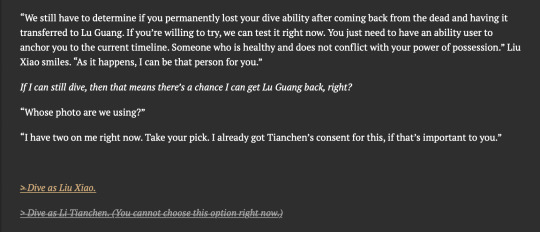
this scene is so underwritten lmao. I'm literally just outlining through dialogue here.
one of my favorites so far. I also used this in a previous example above (the one where lu guang isn't brave enough to ask cheng xiaoshi). yeah, the reader can't choose this particular choice. but now they know that it is a choice. that there's a chance it can be chosen, if not now, then perhaps in another read through.
it's also very apt for a show like link click, which is all about time travel. something something closed loops and butterfly effects. you get it.
7. choices for the unreliable narrator
I love the unreliable narrator trope SO much. so much. so of course I had to make it work with the structure of this fic.

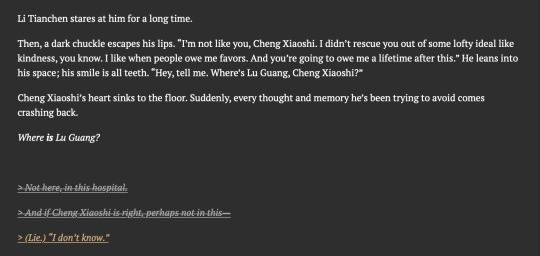
at this point, in both scenes, the story has not revealed yet where lu guang is or what happened to him. cheng xiaoshi knows, but is in denial. he refuses to think about it, and he avoids talking about it in conversations. he is actively stalling this revelation from the reader. the choice is right there, but the character himself doesn't want you to choose it! the reader just has to sit here and deal with his rationalizations until he's ready to face his problems. it's like an active conversation between the character and the reader, without making it a reader insert.
8. choices with subtext
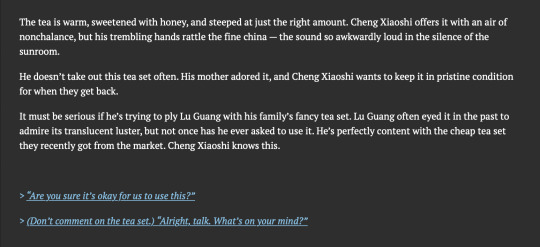
I like this because it's economical and lets me say more with less words. the "(don't comment on the tea set)" says a lot about lu guang's thoughts on the matter without me having to actually write it down. the "(lie)" in the previous example also achieves the same effect.
-
so yeah. I am really enjoying writing this fic. there might be other ways to use choices in a fic that I haven't discovered yet. hmm...
I think it also works very very specifically for link click fanfiction too. link click uses a lot of non-diegetic clues for the audience. for example, the changing eye colors are for the audience's benefit but the characters in the show don't actually see eye colors change. the way the bridon arc pv showed a different timeline from the actual episodes. etc etc. the use of "choices" in fanfiction is probably the closest I can do to achieve a non-diegetic conversation with the reader that resembles, or at least gives a nod to, link click's style of storytelling.
anyway. god. I actually can't believe I've written this much in a weekend. but I'm medicated again, which is fixing my executive dysfunction (I can do stuff now) but I'm still hyperfixated so. this is the result of that, it seems.
0 notes
Text
Everything You Need to Know About Pagan Deity
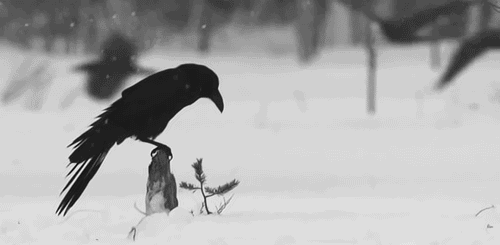
As you’ve probably guessed by now, there are many, many, many different approaches to deity within the wider pagan community. While it would be impossible to summarize all of these different perspectives in a single blog post, this post contains some common themes and best practices that are more or less universal and can be adapted to fit whatever system you choose to work with.
In my Baby Witch Bootcamp series, I talk about the “Four R’s” of working with spiritual beings, including deities: respect, research, reciprocity, and relationship. However, when it comes to gods and goddesses specifically, I think it’s important to include a fifth “R” — receptivity.
If you’re completely new to this kind of work and want to avoid making rookie mistakes and/or pissing off powerful spiritual forces, sticking to the Five R’s of Deity Relationships is a good place to start. The Five R’s are:
Respect. It’s always a good idea to have a healthy respect for the powers you choose to connect with, whether you see those powers as literal gods and goddesses or as archetypes within the collective unconscious (see below). While not every ritual needs to be incredibly formal and structured, you should always conduct yourself with an air of respect and reverence when connecting with deity. There’s no need to humble yourself to the point of cowering before the gods (and in fact, this kind of behavior is a turnoff for many deities), but you should strive to be polite and follow your system’s proper protocol for things like cleansing, offerings, and prayers.
Research. I am of the opinion that you should do serious research into a god or goddess before any attempt to make contact with them. This can be controversial, but in my own experience things seem to go more smoothly when I know what I’m doing. Books are really the way to go for this — the Internet can be useful for connecting with other worshipers and hearing their stories, but it isn’t a good source for nonbiased factual information. I recommend starting with academic sources written by secular experts for a purely historical account that won’t be colored by personal religious experience. Once you have a decent understanding of the basic historical context, look for books by pagan authors who have experience working with this deity. These sources will give you a framework for your own interactions with them.
Reciprocity. As we’ve discussed before, reciprocity is a core value of virtually every pagan tradition. Reciprocity is a mutual positive exchange where all parties benefit in some way, and this quality forms the backbone of all healthy relationships with deity. While we benefit from connecting with the gods, the gods also benefit from our worship. Upholding reciprocity in your relationships with deity means making regular offerings to show your appreciation as well as living in a way that your god or goddess approves of.
Relationship. At the end of the day, connecting with a god or goddess is about creating a healthy, fulfilling relationship. Like any relationship, it takes time and effort to keep the connection alive. The gods are living, thinking, feeling beings just like you and me, though on a much larger scale. Just like you and me, they have likes and dislikes and require certain things from those who want to work closely with them. Try to approach the gods as individuals, and connect with them as you would with another person. This will naturally lead to much more authentic and organic relationships.
Receptivity. To be receptive is to be open and ready to receive whatever comes your way — this is an essential quality for anyone who is serious about connecting with a god or goddess. Connecting with the gods means allowing them a place in your life, whatever they choose to bring with them. It means forming a relationship with them on their terms, and that requires us to give up a certain degree of control. While you should never feel afraid or completely out of control when connecting with deity (if you do, stop contacting that deity immediately), you may very well experience things you did not expect or ask for. Be prepared for these surprises, and understand that when the gods surprise us in this way, they do it in order to help us grow. Let go of any preconceived ideas about what a relationship with this deity “should” look like, and instead let it unfold naturally.
Though there is much more to working with deity than just these values, keeping these values in mind will get you started out on the right foot in your relationships with the gods.
Deity or Archetype?
As odd as it may sound, not everyone who connects with the gods through study and ritual believes those gods to be literal spiritual beings. Some pagans (I would even say the majority of pagans, based on my personal experience) connect with the gods as individuals with their own personalities and agency, but others connect with them as symbols that represent different elements of the human experience. This latter group is working with the gods not as deity, but as archetypes.
The term “archetype” comes from academia, particularly the fields of psychology and literary analysis. An archetype is a symbol that embodies the fundamental characteristics of a person, thing, or experience.
Swiss psychoanalyst Carl Jung argued that archetypes are powerful symbols within the collective unconscious (basically an ancestral memory shared by all of humanity) that arise due to shared experiences across cultures. For example, Jung would argue that Demeter, Juno, and Frigg all represent the “Mother” archetype filtered through different cultural lenses, reflecting the important role of mothers across Greek, Roman, and Old Norse culture. For Jung and his followers, archetypes allow us to connect to latent parts of our own psyche — by connecting with the Mother archetype, for example, you can develop motherly qualities like patience, empathy, and nurturing.
For comparative mythology expert Joseph Campbell, archetypes represented types of characters that appear in some form in most or all global mythology. In his book, The Hero of a Thousand Faces, Campbell identified the “hero’s journey” as the archetypal narrative framework on which most stories, from ancient myths to modern films, are based. (If you’ve taken literally any high school literature class, you’re probably familiar with Campbell’s work.) Like Jung, Campbell has been hugely influential on modern pagans who choose to connect with the gods as archetypes.
Working with an archetype is a little different than working with a deity. For one thing, while archetypes may manifest as gods and goddesses, they can also manifest as fictional characters, historical figures, or abstract symbols. Let’s say you want to tap into the Warrior archetype. You could connect with this archetype by working with gods like Mars, Thor, or Heracles — but you could just as easily do so by working with superheroes like Luke Cage or Colossus, literary figures like Ajax or Achilles, or the abstract concepts of strength and honor.
When pagans worship a deity, it’s because they want to form a relationship with that deity for some reason. But when pagans work with an archetype, it’s usually because they want to embody aspects of that archetype. In our above example, you may be trying to connect to the Warrior archetype to gain confidence or become more assertive.
The biggest difference between worshiping a deity and working with an archetype is that a deity is an external force, while an archetype is an internal force. When you connect with a deity, you are connecting with a spiritual being outside of yourself — a being with their own thoughts, feelings, and drives. When you connect with an archetype, you are connecting with a part of your own psyche. Because of this, archetypes tend to be more easily defined and behave in more predictable ways than deities, although some archetypes can be very complex and multi-faceted.
On the surface, worship and archetype work might be very similar, but the “why” behind the action is fundamentally different.
If you choose to worship the Morrigan, for example, you may have an altar dedicated to her, make regular offerings to her, speak with her in meditations and astral journeys, and/or write poetry or make art in her honor. If you choose to work with the Wild Woman archetype, it may look very similar to an outside observer — you may have an altar dedicated to the Wild Woman energy, speak with manifestations of Wild Woman (perhaps including the Morrigan) in meditation, and write poetry or make art dedicated to this archetype. However, these actions will have a very different intent behind them. Your Wild Woman altar is not a sacred space but a visual trigger to help you connect to the Wild Woman within you. Your meditations are conversations with different aspects of your own personality, not with a separate being. Your art is an expression of self, not a devotional act. The result is a deeper connection to yourself, not a relationship with another being.
I hope I’ve made it clear that archetype work and deity worship can both be very worthwhile spiritual practices, and that each serves its own purpose. Many pagans, myself included, work with both deities and archetypes.
There is some overlap between worshiping a deity and working with an archetype, and many pagans start out with one practice before eventually ending up in the other. Sometimes working with an archetype leads you to encounter a deity who embodies that archetype, which can lead to a relationship with that deity. Likewise, your relationship with a deity may help you become aware of a certain archetype’s influence in your life, which might lead you to work with that archetype.
Making First Contact
First impressions are important. This is true for making new friends, for job interviews, for first dates — and for your first meeting with a god or goddess. In many cases, the way you behave in your first meeting with a deity will set the tone for your relationship with them.
That being said, don’t overthink (or over-stress) about your first impression. You aren’t going to be cursed or punished if you mess this up — at the very worst, the deity might lose interest in connecting with you, and even that can often be remedied with an offering and a polite apology. While it’s always best to get off on the right foot, don’t feel like you need to be perfect.
So, how do you make a good first impression on a god or goddess? Honestly, the rules are largely the same for making a good first impression on any other person. Make sure your physical appearance is clean and tidy — some systems, such as Hellenismos and Kemetic paganism, have special rules for cleansing before contacting the gods, but it’s always a good idea to take a shower first and make sure you’re wearing clean clothes. Likewise, make sure the physical space you invite the gods into is relatively clean — it doesn’t need to be spotless, but take a minute to tidy up before beginning any ritual. Be polite — there’s no need to be overly formal, but you should be respectful. Don’t immediately ask for favors — how would you feel if you met someone at a party and they immediately asked you to do some sort of work for them?
Beyond the basics, it’s wise to make sure you have an idea of who this god is and what they are like before you reach out to them. This will keep you from accidentally doing something offensive. For example, you wouldn’t want to invite them to an altar dedicated to a deity they have a rivalry with. Likewise, you want to avoid offering food or drink that would have been taboo in their original worship. (Of course, there are exceptions to every rule, but when you’re just starting out it’s a good idea to follow the historical framework as closely as possible.)
At the risk of sounding like a broken record: this is why research is so important. Knowing who you are dealing with allows you to deal with them respectfully, gracefully, and competently.
Callings
There’s one aspect of deity worship that is controversial in modern paganism: the idea of being “called” by a deity. This is a question you’ll find many, many heated discussions about online. Do you need to be called by a deity to form a relationship with them? Do deities choose their followers, or do we choose them? How do you know what a call from a deity even looks like?
As I said, this is a controversial topic, but I firmly believe that 1.) you do not have to feel called to a deity beyond being interested in them, and 2.) feeling drawn to a deity’s image, symbols, and myths is a form of calling.
Many pagans do feel like they were called or drawn to the deities they walk most closely with. They may have encountered myths of that deity as a child or teenager and deeply resonated with them, or may have always had an affinity for that god’s sacred animals. They may have dreamed of this deity before knowing who they were, or may have felt a spiritual presence around them before identifying it as a god or goddess.
Many people first encounter the gods in fiction, only for this fictionalized depiction to spark a deeper connection that eventually leads to worship. In the modern era, it’s entirely possible for someone who worships Loki to have first encountered him (or at least a character loosely based on him) in Marvel comics and films, or for someone who worships the Greek pantheon to have first discovered them through the Percy Jackson books. As far as I’m concerned, this is also a valid “call” from deity. The gods are very good at communicating with us through the means available — including fiction.
That being said, just because you don’t already feel a strong connection to a god or goddess doesn’t mean you can’t or shouldn’t worship them. The connection will come with time and effort, just like in any relationship.
Dedication, Patrons, and Matrons
In online spaces such as Tumblr and TikTok, a lot of inexperienced pagans parrot the idea that every pagan needs to have a designated matron and/or patron god and/or needs to be formally dedicated to a god in order to have a close relationship with them. Not only is this untrue, but such restrictions can actually cause harm and/or stunt spiritual growth.
Let’s address dedication first. To be dedicated to a deity means to outwardly declare yourself a servant of that deity, usually with a formal dedication ritual — think of it as the pagan version of joining a convent or going to seminary. It is an outward expression of your devotion and loyalty to that deity. Dedicants are held to a higher standard than the average worshiper by themselves, their communities, and the god(s) they have dedicated to.
Dedication can be a powerful and fulfilling spiritual experience (it’s the backbone of many peoples’ spiritual practice), but it should not be taken lightly. Dedicating yourself to a god or goddess should be a sign of your commitment to them and a deepening of your relationship — it should not be the beginning of that relationship.
Dedication is a lot like marriage. Just like you wouldn’t marry someone you’ve only been on a handful of dates with, you shouldn’t dedicate to a deity just because you’ve had one or two positive experiences with them. Like marriages, dedication can be difficult to get out of — ending your dedication to a deity is possible, but it’s a messy, complicated, uncomfortable process that is sure to shift the foundation of your entire spiritual practice, and not always for the better.
My advice to new and inexperienced pagans is not to even consider dedication until you’ve been practicing for several years. As you begin your journey, your focus should be on exploring your options, forming meaningful connections, and developing a practice that works for you and your unique spiritual needs. Now is the time for experimentation, not lifelong commitments.
But let’s say you are an experienced pagan, and you feel like you are ready for dedication. How do you know if you should dedicate to a given god or goddess?
Dedication may be the logical next step in your relationship with a deity if:
This deity has been an active part of your spiritual practice for at least 2-3 years, with no major gaps in contact with them
You are comfortable upholding this deity’s values for the rest of your life — and are willing to face consequences if you fail to do so
You are willing to dedicate a significant amount of time and effort to the service of this deity
You are willing to face major changes in your life outside your spiritual practice — dedicating to a deity often leads to major shifts that may affect our career, family, and/or relationships
If you answered “yes” to all of the above, dedication may be appropriate. This may seem overly cautious, but remember that dedicating to a deity is a serious, lifelong commitment akin to joining the clergy. For context, it takes at least five years of study and practice to become a Catholic priest, a similar amount of time to become a Jewish rabbi, and three years to become a high priest/ess in Traditional Wicca. If you don’t have the patience to maintain a relationship for a few years before dedication, that is probably a good indicator that dedication isn’t for you.
If you are dedicated to a deity or are planning to dedicate, you may actually choose to attend seminary or receive some other formal religious training. This training will help you to better serve your deity in a public capacity, as you will learn skills like religious counselling, leading ritual, and building community. If your program of study includes ordination, it will also allow you to perform legally binding religious rituals like marriage ceremonies. Depending on your path, attending seminary or training may be your act of formal dedication.
Finally, let me make it clear that dedication does not make you a better pagan than someone who is not dedicated. The choice to dedicate or not dedicate is only one element of your spiritual practice, and it is possible to have a fulfilling and life-affirming practice without dedication. Some of the people who do the most work in the service of the gods are not dedicated to them. You may be one of these people, and that is totally okay.
Patron/matron relationships are a specific type of dedication.
The concept of patron deities comes from Wicca and related neopagan religions. As we’ve previously discussed, Wicca is a duotheistic system with a God and Goddess, whose union is the source of all creation. However, because Wiccans believe that all gods are manifestations of the God and all goddesses are manifestations of the Goddess, some covens choose to work with the God and Goddess in the form of other deities (say, for example, Osiris and Isis), which are referred to as the coven’s “patron” and “matron” deities. In these covens, initiation into the coven’s mysteries (traditionally in the form of first, second, and third degree initiations) typically acts as a form of dedication to these deities.
As Eclectic Wicca has gained popularity in the last few decades, there has been a growing trend of individual Wiccans and eclectic pagans choosing personal patron and/or matron deities. Some Wiccans will have a single god or goddess they are dedicated to, while others feel that it is very important to be dedicated to exactly one masculine deity and exactly one feminine deity. This second model is the one I see most often in online pagan spaces, especially Tumblr and TikTok.
The patron/matron model can be useful for some pagans, but it is not one-size-fits-all. As I mentioned, this model of dedication comes from Wicca, and is a very modern concept. In ancient pagan religions, most people would not have been dedicated in this way. That does not mean that this isn’t a valid form of worship (it absolutely is), but it does mean that those who practice reconstructionist paths may not be inclined to interact with deity this way.
The guidelines for patron/matron relationships are similar to the guidelines for dedication in general, but these relationships often (but not always) have a more parental nature. For some people, having a divine mother and/or father figure is ideal — especially for those who are healing from parental trauma or abuse. If you feel drawn to this type of deity relationship, I encourage you to explore it.
On the other hand, you may not have any interest in the patron/matron model, and that’s totally fine! It’s called polytheism for a reason — if you prefer to maintain less formal relationships with many gods, you should feel free to do so.
I hope this post has helped clarify some of the murkier aspects of polytheism and deity work. Obviously, this is only the tip of the iceberg — I could write a book about this topic and many, many authors already have. However, I think the information here is enough to get you started, and I hope that it will provide a first step on your journey with your gods.
Resources:
Wicca for Beginners by Thea Sabin
A Witches’ Bible by Janet and Stewart Farrar
The Spiral Dance by Starhawk
Where the Hawthorn Grows by Morgan Daimler
The Way of Fire and Ice by Ryan Smith
Jessi Huntenburg (YouTuber), “Dancing with Deity | Discovering Gods, Goddesses, and Archetypes,” “Archetype, Deity, and Inviting Transpersonal Experience,” and “10 Ways to Bond with Deity”
Kelly-Ann Maddox (YouTuber), “How to Have Deep Connections with Deities”
#paganism 101#paganism#deity work#dedication#devotional witchcraft#devotional#eclectic pagan#wicca#wiccan#pagan#baby pagan#baby witch#witchblr#witch#witchcraft#religion#theology#goddess#patron god#matron goddess#spiritual#polytheism#witchtok
405 notes
·
View notes
Text
The Sherlock Holmes stories by Arthur Conan Doyle are serviceable detective fiction in themselves if you don't mind bigoted stereotypes in lieu of characterization. A detective story does not have much time and has a lot to say, so most characterization will be extremely stereotypical, with the possible exception of the character of the detective (and even then the demands of serialization are considerable), but the specific kinds of stereotype Doyle uses are quite unpleasant. It is generally not possible for a reader to figure out the mysteries, which almost always hinge on hidden information and counter to the presentation tend to privilege an arbitrary and often highly illogical interpretation of the part of the evidence that is provided, but you do occasionally get to feel clever (I knew it was a jellyfish!), and the stories manage to build suspense well enough.
But of course I did not read the entirety of Sherlock Holmes because I wanted to enjoy some detective fiction, really. I persisted in reading it because I felt like it was an interesting testament to elements of late 19th century British society, and who doesn't love the deranged ramblings of an empire that doesn't quite understand it's doomed? I have touched on the use of bigoted stereotypes. I do not think dwelling on Doyle's moral status is particularly useful, though it is worth remarking that on a handful of occasions he attempts to be actively progressive with his writing. From other 19th century British work I would guess that the beliefs implied by the stories are reasonably similar to the beliefs of 19th century Britain, except in the case of a handful of Doyle's eccentricities that are mostly identifiable from the text.
Doyle gives us an image of a society which is obsessed with phrenology, race science, misogyny, and free trade. I do not mean merely that the narrative treats phrenology, race science, and misogynistic pseudopsychology as useful pieces of information about the world, though it does to a genuinely shocking degree (it also validates graphology, because Arthur Conan Doyle was just incredibly gullible in general). What I mean is that when Arthur Conan Doyle looks for some arbitrary and thematically irrelevant topic of discussion for some men of culture to embark on, they will more likely than not discuss the latest developments in those fields. Is this just a particular preoccupation on the part of the author? I don't have a representative sample of other texts from the time to compare to, but it sure is remarkable.
The thing I find interesting about Sherlock Holmes is that the point is at least nominally the immense power of reason. So it is interesting to observe which people reason is attributed to, and which people it is not. In particular, reason is only rarely displayed by foreigners, especially not displayed by non-whites, extremely rare if at all possible among the lower classes, and highly unusual in women (children are not sufficiently prominent to determine). Any intelligence or competence displayed by these groups is almost certain to be described as the result of "cunning", probably by reference to animal metaphors. Reason is predominantly the province of Anglo-Saxon upper-middle and higher class men, though of course they may or may not actually display it. As a side-note, it doesn't seem that what we would now regard as mental illness is regarded as particularly significant in this respect, it is not necessarily disqualifying and the absence of it is no guarantee of ability. Mental illness is socially constructed, what else is new.
There is an interesting quirk as regards America, actually. In America, you do not need to be high in the class structure to be rational. It appears that America is considered not a classless society but one in which class is less important, even as regards mental faculties. There is another peculiarity of the United States in the novels, there is one story in which Holmes proclaims himself a partisan of Anglo-American unification and world conquest under a flag incorporating both the Stars and Stripes and Union Jack. This was a real but fringe position at the time, based on the much more common (and also evident in the stories) belief in the superiority of the supposed Anglo-Saxon race. One of the traces of Doyle's more esoteric political beliefs there.
I think the a priori exclusion of people from reason displayed in the Holmes stories is a matter worth considering for those who feel reason has been unfairly maligned by society. If you were similarly excluded, how would you feel about the social institutions of reason and reasonableness? Irrationalism is a refuge of scoundrels, but is it possible that at least some of the critics of reason correctly judge that they are considered to be excluded in this way? Food for thought, perhaps.
4 notes
·
View notes
Text
Renga Shouldn’t Be Canon (clickbait)
No but seriously, I hope that Renga doesn’t become canon, at least not in the way that I think a lot of people are hoping that it will. Personally, I’m not expecting anything close to a kiss and confession and that’s fine by me.
Queerbaiting is a problem in mainstream media, there’s no doubt about it, and many people both within and outside the queer community are right to feel wary about hoping for that kind of representation. Personally, I’m still caught by surprise every time a queer person or couple is depicted in a normalized and healthy way onscreen. And that just speaks to the appallingly poor representation queer people are so used to seeing.
But I think that fandom likes to throw the word “queerbaiting” around a bit haphazardly, much in the same way faux woke people throw around words like “gaslighting” and “cancel culture”. They’ve become buzz words to evoke immediate feelings of self-righteousness and to prey on person’s fear of appearing ignorant or bigoted.
Unfortunately, I worry that when the season inevitably ends without Renga’s “canonization”, people will unfairly label Sk8 as Queerbait. And I have many Feelings about this- mostly frustration.
But we’re only mid-season. I can only guess where the show is going to go and only make assumptions about fandom behavior based on personal experience, and there’s a high possibility I’ll be proven totally wrong so... take whatever I say with a grain of salt. But anyway, let’s get on with it.
Fundamentally, Sk8 isn’t shoujo, it’s not BL- it’s a sports anime. And while that doesn’t preclude a total absence of romance between its characters, ultimately those aren’t the kinds of relationships that sports anime concerns itself with. The most prominent relationships you’ll see will be more along the lines of Teammates and Rivals (there's also a third dynamic I'm calling Opponents which is Not the same as Rivals but the Opponents dynamic is less relevant to my point so I'll focus on just the first two).
However, it's not hard to see why romantic interpretations are so common among fans of sports anime. At their core, the basis of Teammate and Rival dynamics bear many similarities to that of a compelling romance. Both Teammate and Rival relationships are built upon two characters' mutual admiration and respect for one another, they involve characters learning from one another and being inspired to push themselves to be their best. There's a great deal of trust involved, as is vulnerability, communication, and empathy. In other words, all the essentials of any healthy relationship.
But context and genre are important. I think that a good romance is one that is unique to its characters specific personalities and needs, as well as is believable within the context of the setting and story. For an anime like Sk8, I would find an on-screen kiss strange and out of place (unless it was done for comedic effect which would be... bad).
I'm reminded of this quote from Portrait of a Lady on Fire, which is one of my all time favorite films:
"Do all lovers feel as though they are inventing something? I know the gestures. I imagined them all waiting for you."
And that basically sums up what I've described, albeit more poetically. Love is invention. Romantic gestures form a unique language between lovers. And if I may add, genre and narrative establish the basis for the emotional significance of these gestures.
In a genre like action/thriller, one of the most meaningful things a character can do is risk their safety or straight up sacrifice themselves for another, because bodily harm and physical risks drive the tension in these kinds of narratives. In the romance genre, confessions, physical intimacy, and grand romantic displays serve the same purpose. In something like sports anime, I argue that its gestures like physically accommodating for your teammate, supporting them when they feel dejected, and being motivated to train harder and be better for the sake of being allowed to stand beside them, that hold equivalent significance.
But this is all broadly speaking, and genre is just one element. Characters’ personalities, habits, insecurities, and trauma, as well as a story’s themes, further specify the kinds of gestures that hold the most meaning in a narrative.
Let’s look again at Portrait of a Lady on Fire, on my favorite scenes:

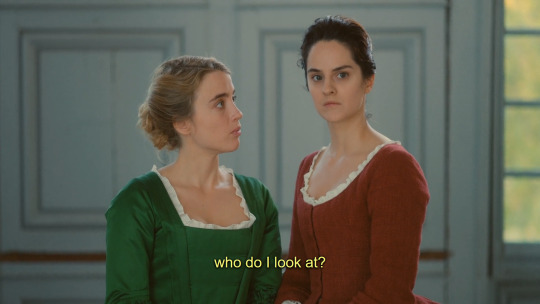

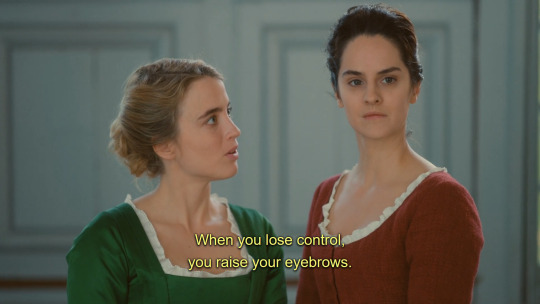
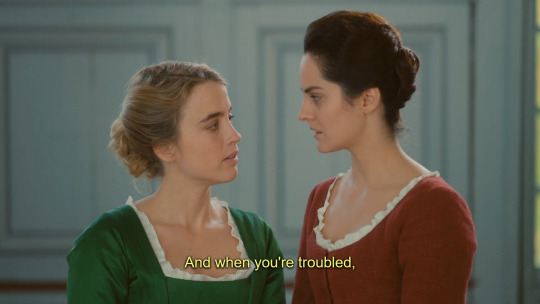
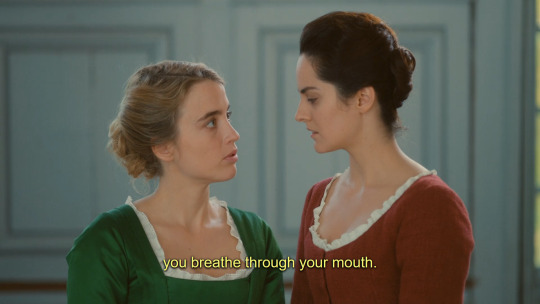


Portrait is interested in subverting the power imbalance inherent between the Artist and the Muse, the Voyeur and the Subject, the Looker and she who is Looked At. Heloise’s observations of Marianne hold great significance because of this theme; she disrupts the power imbalance by taking back agency as the Subject, demonstrating that she is just as capable of Looking at the Artist just as the Artist does at her. This is visually represented by the framing of the final shot. With the camera pulled back, we now see Marianne as Heloise has been seeing her, and she is now subject to being visually scrutinized in the same way that Heloise has been up to this point in the film.
This scene is so poignant because the romantic gesture it depicts ties heavily to the story’s themes, its characters’ personalities, and its existence is believable within its genre.
Now, let’s bring this all back to Sk8. In this show, what sort of gestures are given the most significance?
Skateboarding. Duh.
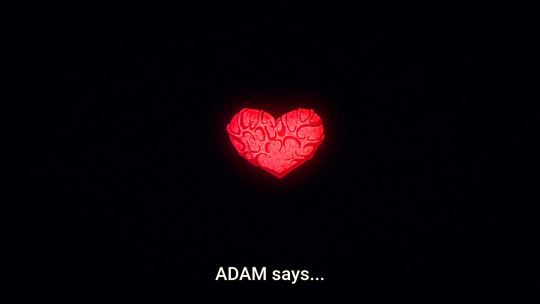
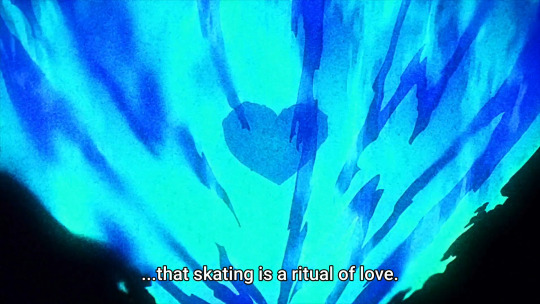
Basically, this line establishes that “basis for emotional significance” that I mentioned earlier, such that skating is the means by which characters and relationships are developed and the plot is driven forward, that any and everything related to skating potentially holds symbolic meaning.
And specifically, equating the act of skating to love then allows for more romantic interpretations of all kinds of scenes. Take for example, these parallel sets of shots from ep 1:
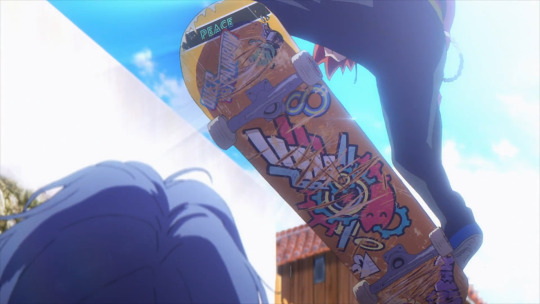
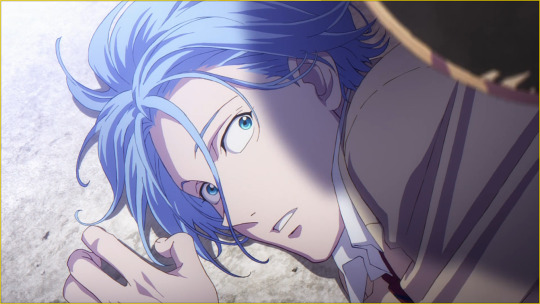
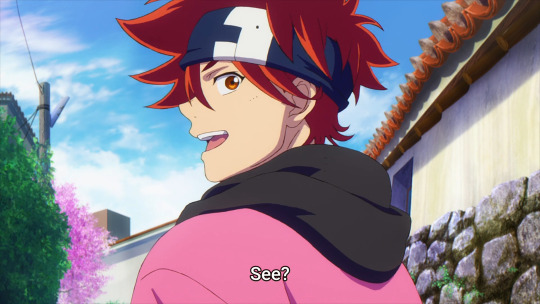

(I mean cmon look at his tiny blush, it’s fucking adorable) And:
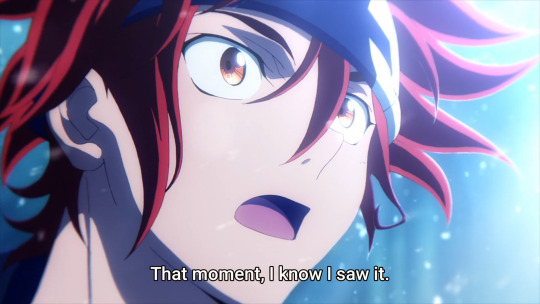

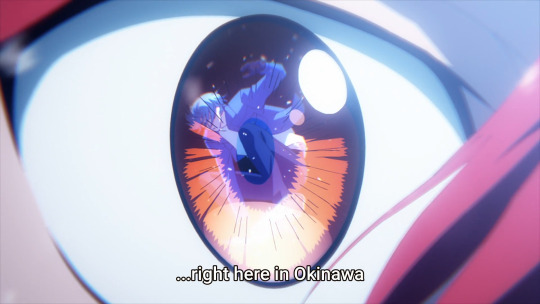
In a show that equates skating to a “ritual of love”, these scenes can be realistically be interpreted as Langa and Reki falling in love with one another. Skating acts as both the catalyst for their relationship as well as later on being the means by which they express their feelings and develop their relationship.
Skating is their love language.
Ok, I’ll try to wrap this up since this post has gotten wayyy too long. But basically my point is that Renga is about as canon as this show could possibly make it within the confines of its genre and narrative. Romance in sports anime is different from romance in shoujo, but it’s romance all the same, in the same way that different people express love in different ways.
A kiss and confession is not the only means by which a ship can become canon. And I personally would much rather have this kind of carefully crafted symbolism than a kiss just randomly shoehorned in.
But I understand that in the face of centuries of censorship, cop-outs, and barely believable and forced heteronormativity, people want same-sex intimacy onscreen, unapologetic and normalized. I get that.
But in my opinion, Sk8 isn’t queerbait, and it shouldn’t be accused as such just because its characters won’t kiss onscreen. I think this show depicts a wonderful and loving relationship between two boys, that isn’t any less loving just because it doesn’t fit into conventional romantic tropes.
Edit: I did a followup post about Sk8 and its queer representation here, where I go more in depth into the ways that Sk8 represents queerness through beyond its implied homo-romantic relationships.
So yeah, I’d love to hear yalls thoughts :)
#this is gonna get me cancelled#i kno it to be true#but Some Bitches like to reduce romance to kissing and sex#which is the smoothest fucking brain take i have EVER heard#gay ppl invented romance#Good Romance#i don't make the rules#sk8#sk8 the infinity#sk8 meta#renga kyan#langa hasegawa#renga
314 notes
·
View notes
Text
Lore Olympus Speculation: Zagreus and Dionysus
Ok so a few mild corrections and warnings first: I framed my theory last time under the assumption of a prophecy, only to realize immediately after that there's no need for it, per se. Demeter could just be displaced in her interpretation of the Rule of Successions. Instead of it being that the previous usurpers rose to power thanks to fertility goddesses, it could be that those were their downfall, since fertility goddesses are destined to produce the next heirs of the world. After all, even though the female Olympians are not born from Rhea in this version, they are born from the explicitly confirmed as a fertility goddess Metis, who in the original myth was devoured/assimilated(?) by Zeus specifically to prevent her from siring children who would replace him.
Also, last part was a bit far reaching, but not too much given the point of the story we're at in now. This part however is WILD in terms of the details I speculate on. I have faith in my theory, of course, but I also understand that I could be completely wrong about it. But hey, what is fandom for if not for having fun trying to get ahead of the author in guessing what they're planning, am I right?
Ok, so Dionysus is 100% coming since we were already introduced to the currently not pregnant Semele and he historically has a connection to Persephone in some of the myths. Zagreus' inclusion as a separate entity is a bit more debatable, since there is at least one version in which he is born, killed and reincarnated explicitly as Dionysus, but as I mentioned before in the previous part there's a bunch of narrative cues in the story that seem to be pointing to his appearance specifically as a son of Persephone and Hades alone. The focus on Hades' "infertility", on how Apollo, who is arguably the antagonist who has caused the most damage to Persephone thus far has his eyes set on Zeus' throne, and on Metis and Thetis who are both known for being disposed of by Zeus before they could bore him children who could be a threat to him, all seem to point that eventually the big one-upmanship that Persephone will deal to them is bearing and raising the son of Hades that will depose Zeus.
Also it is part of my theory that both Dionysus and Zagreus will be purple with the main difference being that Zagreus will have white hair like Hades while Dionysus will have black hair like Zeus. It just seems like a cool thing to do. Again this is purely my ravings made for fun and I absolutely acknowledge that I could be wrong. With that out of the way, let's move on to the speculation:
Zeus Does The Dick Move Of Manipulating (and/or Framing) Hera
So. Zeus has just clowned himself up his own ass and beyond. He girlbossed a little to close to the sun, if you will, and now Persephone is pregnant. Shit. But he can't take direct action against the baby lest people start asking questions. Also the underworld is probably like, really fucking excited about this.
However, say Semele also gets pregnant around this time. And Hera gets suspicious, although maybe she doesn't have all the details yet. And so, Zeus gets an idea.
The Hera we know in this telling is just a bit too... composed for what we know about her from the myths. Yeah, she can get vengeful and maybe even petty, but she doesn't always express it in a fit of impulsive rage. Whatever anger and envy she felt towards the women Zeus cheats him with has now subsided into the resigned frustration of the insult that the affairs represent towards her. After all she is not doing anything in particular about Thetis, right? Not in the way she does to other women in the myths, anyway. She is a Queen with a capital Q here, and she needs to act as such. But what if, for whatever reason, Dionysus represents a threat to her children?
I mean, we know that eventually he'll come to replace Hestia in the Olympian pantheon. But while I'm not saying that that'll be his intention from the outset, I think Zeus will let it drip that he is planning on favoring Dionysus over the others for whatever reason. That's when Hera gets panicky and hasty. And Zeus takes advantage of that.
Maybe he uses Echo for this. All she has to do is to tell Hera where this other conspicuously purple kid is and boom. Hera plans a hit. Actually, whether she goes through with it or not is irrelevant. The moment it comes out that Persephone and Hades' kid, the hope for an against-all-odds Prince of the Underworld, was assassinated, all Zeus has to do is establish a probable case against Hera and he just killed two birds with one stone while washing his hands.
Semele burns and Persephone raises Dionysus
The press goes insane with the news. Hera's reputation dives harder than a rock thrown at the sea. Maybe Persephone and Hades hate her now, or maybe not! Maybe all 3 of them know by now that Zeus is full of shit, but can't get the news out that Zagreus survived for fear that he will try to kill him again or some other reason. Whatever the case, Hera decides that if she is going to be the bad guy in the eyes of the public, she may as well do something deserving of the title. She arranges the whole Semele shebang we know about. Maybe this is the part where she puts that punishment on Echo as well. In any case, luckily or not Zeus gets to rebuild what's left of Dionysus. But with Hera having no fucks left to give he can't take him straight to Olympus.
This next part also depends a bit on whether Hera managed to warn Persephone and remain friends or not. If she didn't then Hades will probably ban her from the Underworld like with Leto and Apollo. If that's the case maybe Zeus feels comfortable with announcing that he has another child at that moment? But I think it'll be more likely that he keeps quiet about it and gives him to Persephone and Hades in secret. Eventually, Persephone decides to let him grow up in the mortal realm, but doesn't repeat Demeter's mistake (or maybe she does at first, but grows out of it) and lets him figure out his stuff as a god, even if he's not officially recognized as one by Olympus while he is there. Meanwhile, as a being born in and from 2 underworld beings Zagreus may or may not have a limitation on how much time he can spend away from the underworld, but it's likely that he'll be raised closely to Dionysus, with both of them aware of their particular circumstances and having some form of a brotherly relationship, hopefully.
Dionysus Revealed through the Bacchae
What happens next is the Bacchae, of course. To recount: Semele's family bans the cult that Dionysus is amassing and laughs at the idea that he could be the son of Zeus, so he retaliates by driving his aunts crazy, and gaslighting his grandpa with his real form until the aunts rip him into pieces.
Such an act of wrath does not go unnoticed by Zeus, but since by this point Dionysus has amassed a fuckton of followers and started his own cult, he has no choice but to recognize him. The news go insane and when Persephone's involvement is revealed the yellow press start speculating that Persephone toooootally had an affair with Zeus, you guys, we swear, which, of course, he does nothing to dissuade even if it annoys her and Hades because that's just how Zeus is. For whatever reason, Hestia gets demoted and he ascends as an official Olympian. Which is bad news for...
Apollo vs. Dionysus
Leto and Apollo's agenda is to keep him as THE most popular youthful god around, particularly with the mortals who have a lot of use for him because of the reach of his domains, and also probably eventually let it come out to light that he is a legitimate son of Zeus. For the moment only Hermes can compete with him in those terms, but since he is more focused on his own thing and whether he is a son of Zeus in this version is still up in the air, they don't seem to think of him as a threat for now, at least at the point in which we are in the story. You know who else could compete in those terms, though? Dionysus, god of wine and theatre, son of Zeus, newest god extraordinaire, and who is famous for amassing ravenous amounts of fans.
The massive kick in the balls that Dionysus will represent to Apollo is sure to be nothing short of hilarious and I cannot wait to see it happen. Especially when you take the Nietzschean dichotomy between the two, where Apollo represents societal acceptance vs Dionysus' transgressive, fringes-of-society nature. Point is, they'll be enemies in the competition for Zeus' succession. That being said, I doubt that Dionysus will be genuinely interested in it beyond doing stuff to annoy Apollo, although I'm obviously getting to ahead of myself by trying to predict his characterization in this version. But yeah, I fully believe they will be antagonistic towards each other. In some versions Apollo is also part of the team that keeps Zagreus' dismembered parts under his supervision, just in case making him an explicit enemy of his parents in this version of the story wasn't enough, so add that up to the potential conflicts in this narrative.
Orpheus Does His Thing And Ends Up Revealing Zagreus
As most of you reading this should know by now, Orphism is the religion that muddied the Zagreus waters even further by making him an epithet of Dionysus. My conclusion to this is that in this version Orpheus ends up meeting Zagreus -who may or may not be in the Underworld due to his possible restrictions- and he tries to deflect by claiming he's just Dionysus with an epithet. And while this succeeds in keeping the mortals ignorant, the news have already reached Apollo, Orpheus' father, before the maenads kill him (maybe Dionysus orders them to do that to try and keep the secret) and he goes and snitches on Zeus.
And that's the point where I have no idea what happens next. I mean, seriously, even though we all know that Persephone and Hades will end up married and all that jazz there's no way to predict how the story will end, since greek mythology doesn't have a Ragnarok, or at least not one that is permanent. Even if I happen to be right about everything I have no idea what a pantheon lead by Zagreus would look like, so I can only wait and see in excitement for what's to come next. And I'll be sure to enjoy every second of it ;)
#lore olympus#lo theory#lore olympus theory#lo speculation#lore olympus speculation#lo persephone#lo hades#lo demeter#lo zeus#lo apollo#lo leto#lo thetis#dionysus#zagreus#lo metis
37 notes
·
View notes